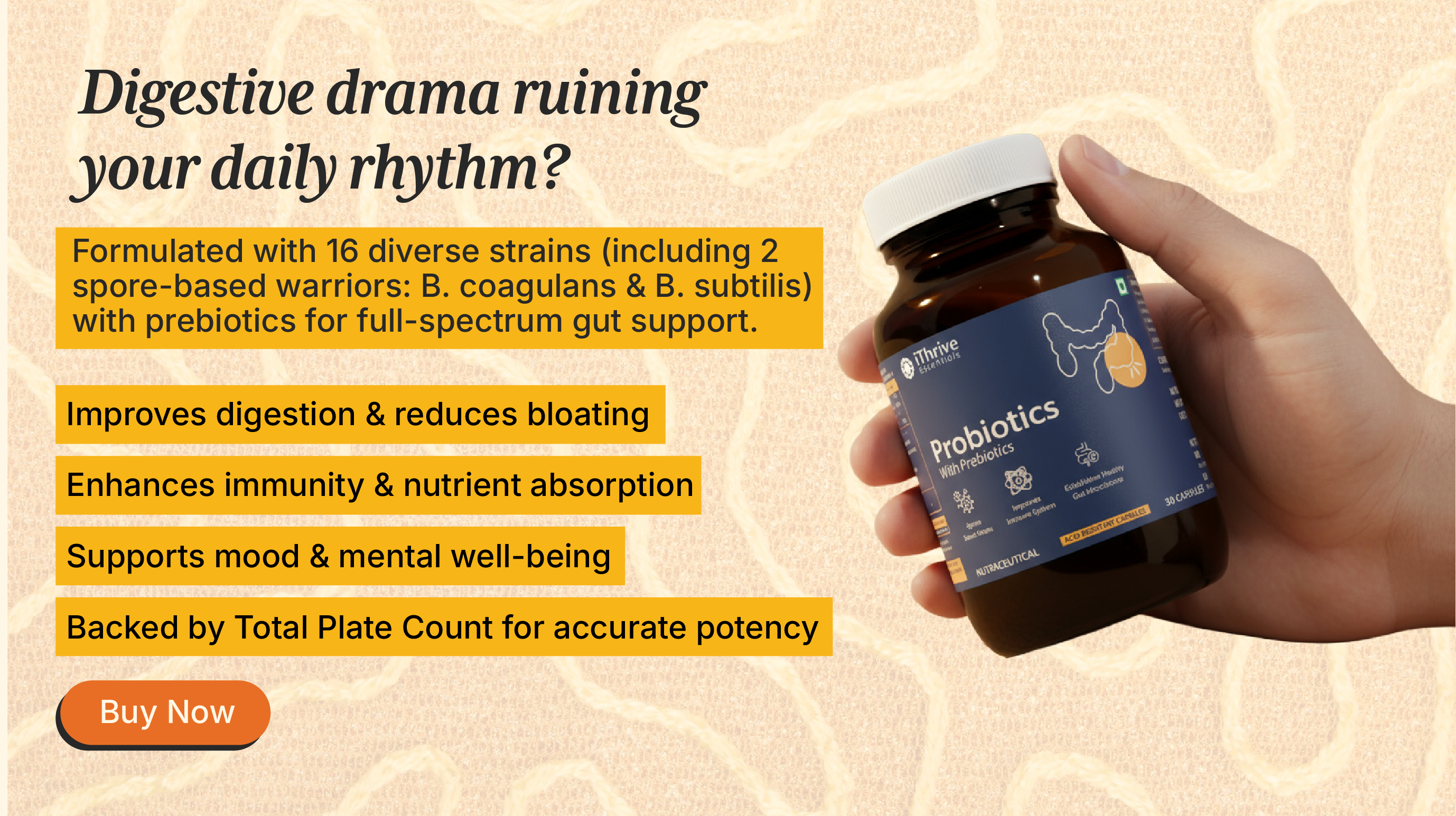Your gut is more than just a place that digests food, it plays a big role in your overall health. A healthy gut can boost your energy, improve your mood, strengthen your immunity, and even make your skin glow. But when your gut is not working well, you might feel tired, bloated, moody, or notice skin problems. Gut harmony means your digestive system and the good bacteria in your gut are working together smoothly. When this balance is right, your body digests food properly, absorbs nutrients efficiently, and keeps your mind and body feeling their best. In simple words, a gut in harmony helps you feel lighter, healthier, and more energetic every day.
In this blog, we will focus on how to know if your gut is healthy or not, what causes gut problems, digestive health tips, ways to support your digestion and bring your gut back into balance. An insight from iThrive’s POV.
Is Your Gut Doing Fine?
Not everyone knows when their gut is out of balance, but there are signs you can notice in everyday life. If your gut is healthy, you usually have regular bowel movements, feel light and energetic, your skin looks clear, and your mood stays steady. On the other hand, if your gut is struggling, you might experience bloating, gas, constipation or diarrhea, fatigue, brain fog, mood swings, or even skin problems like acne or rashes. Paying attention to these signals can help you understand how your digestive system is doing and whether it needs some care.
If you are facing any gut-related issues and aren’t sure what’s actually going wrong, don’t ignore the signals. You can book a free consultation with iThrive, where our team of experts will help you assess your symptoms, guide you towards better personalised solutions and provide you ways to support your digestion.
Why Does Gut Health Go Wrong?
Gut problems often happen because of common lifestyle habits that we may not even notice.
- Eating too much processed or sugary food: Foods like fried snacks, sweets, and packaged meals can disturb the balance of good bacteria and slow digestion.
- Low fiber intake and lack of probiotics: Not eating enough fruits, vegetables, and whole grains can make bowel movements irregular and feed unhealthy gut microbes.
- Skipping meals or irregular eating: Eating at inconsistent times can confuse your digestive system and lead to bloating, acidity, or discomfort.
- Chronic stress: Stress affects gut function, causing gas, cramps, or irregular bowel habits.
- Poor sleep: Lack of sleep disrupts gut bacteria and slows digestion.
- Sedentary lifestyle: Too little movement can slow down digestion and make elimination harder.
- Frequent use of certain medications: Antibiotics, painkillers, and some supplements can harm gut bacteria if used often.
These common habits reduce gut microbial diversity, making digestion inefficient and causing fatigue, weaker immunity, mood swings, and other health issues.

1. Eat More Fiber-Rich Foods
Fiber is one of the most important nutrients for gut health and considered healthy gut habit. It acts as food for the good bacteria in your gut, helping them grow and keep your digestive system balanced. Fiber also adds bulk to your stool, making bowel movements smooth and regular. Without enough fiber, digestion can slow down, which often leads to bloating, constipation, gas, or general stomach discomfort. Over time, low fiber intake can even affect your metabolism and overall energy levels. Here are some of the digestive health tips:
Tips to include more fiber in your diet:
- Add fruits to one serving in a day: Fruits like apples, berries, bananas, pears, and papaya are rich in fiber and also provide antioxidants that support gut health. Try having a fruit smoothie in the mid morning or a fruit salad as a snack. Pair fruits with good quality fats like coconut pieces or pumpkin seeds to avoid sugar spikes
- Let's add fruit smoothie in the mid morning
- Include vegetables in every meal: Vegetables like carrots, beans, broccoli, and bell peppers are excellent sources of fiber. Steaming, lightly sauteing, or roasting vegetables can make them easier to digest.
- Choose whole grains over refined grains: Swap white rice, white bread, and regular pasta with oats, quinoa, white rice and millets. Whole grains not only add fiber but also provide sustained energy throughout the day.
- Include legumes for protein and fiber: animal proteins, Lentils, chickpeas, moong dal, rajma, and black-eyed peas are excellent sources of both protein and fiber. They keep you full for longer and support a healthy gut microbiome.
- Start gradually and drink water: If your body isn’t used to a high-fiber diet, increase your intake slowly to avoid gas or bloating. Always pair fiber-rich foods with plenty of water, hydration helps fiber move smoothly through your digestive system.
2. Stay Hydrated
Water plays a crucial role in digestion and overall gut health. It helps break down the food you eat, allows nutrients to be absorbed efficiently, and helps move waste through your intestines. When your body is dehydrated, digestion slows down, which can lead to constipation, bloating, and discomfort. Staying hydrated also supports the good bacteria in your gut, helping maintain a healthy balance.
Tips to stay properly hydrated:
- Start your day with water: Drink 1-2 glasses of water as soon as you wake up to jumpstart your digestive system.
- Sip water throughout the day: Keep a water bottle with you and take small sips regularly instead of drinking a lot all at once.
- Include hydrating foods: Fruits like watermelon, oranges, and cucumber, or foods like coconut water and soups, also contribute to your daily hydration.
- Replace sugary drinks: Avoid excessive sodas, packaged juices, or energy drinks, as they can disturb gut bacteria. Instead, opt for plain water, herbal teas, or infused water with lemon, mint, or cucumber.
- Pair water with fiber intake: Drinking enough water is especially important if you’re increasing fiber in your diet, as it helps fiber move smoothly through the digestive tract and prevents bloating.
3. Manage Stress
Stress doesn’t just affect your mind, it directly impacts your gut. Your brain and gut are connected through what’s called the gut-brain axis, which means high stress levels can slow down digestion, increase inflammation, and upset the balance of good bacteria. This can lead to bloating, cramps, irregular bowel movements, or even worsening of conditions like IBS. Chronic stress over time can weaken your immunity and affect energy, sleep, and overall well-being.
Tips to manage stress for a healthier gut:
- Practice deep breathing or meditation: Even 5-10 minutes daily can calm your nervous system and improve digestion. Simple breathing exercises can help you get started.
- Go for short walks or light exercise: Movement helps release tension and stimulates gut activity. A 15-20 minute walk after meals is especially beneficial.
- Keep a journal or write down worries: This helps you process emotions instead of letting stress build up and affect your digestion.
- Engage in hobbies or relaxing activities: Reading, music, painting, or spending time with loved ones can reduce stress and support gut health.
- Prioritize “digital detox” breaks: Constant screen time and notifications can increase stress. Take small breaks during the day to relax your mind and body.
4. Eat Mindfully
How you eat is just as important as what you eat. Eating too quickly, while distracted, or in a rush can make it harder for your body to digest food properly. When you eat mindfully, you give your digestive system time to break down food efficiently, absorb nutrients, and avoid common issues like bloating, gas, or indigestion. Mindful eating also helps you recognize when you are full, preventing overeating and unnecessary strain on your gut.
Tips for mindful eating:
- Chew food properly: Take time to chew each bite thoroughly. This helps break down food mechanically and makes it easier for your stomach to digest.
- Avoid distractions: Try not to eat while watching TV, scrolling on your phone, or working. Focus on your food and enjoy each bite.
- Take smaller bites and pause: Eating slowly allows your body to signal when it’s full, which prevents overeating.
- Listen to your body: Stop eating when you feel comfortably full, not stuffed. Overeating can cause bloating and discomfort.
- Make mealtime enjoyable: Set aside dedicated time for meals, eat in a calm environment, and appreciate your food. This reduces stress on your gut and improves digestion.
5. Prioritize Sleep and Movement
Your gut needs both rest and activity to function properly. During sleep, your body repairs itself, balances hormones, and allows your gut bacteria to recover and thrive. Poor sleep can disrupt this process, leading to slower digestion, bloating, and even changes in appetite or metabolism as well as circadian rhythm. On the other hand, physical movement stimulates your digestive system, helping food move through your intestines and preventing constipation. Together, good sleep and regular movement support a healthy, balanced gut.
Tips for better sleep and movement:
- Maintain a consistent sleep schedule: Try to go to bed and wake up at the same time every day, aiming for 7- 8 hours of sleep. Also try to avoid screen exposure before bedtime.
- Avoid heavy meals and caffeine before bed: Eating late or consuming stimulants can disturb digestion and sleep quality.
- Include daily movement: Light exercises like walking, yoga, stretching, or cycling keep digestion active and improve blood flow to the gut.
- Take short walks after meals: Even a 10-15 minute walk after eating can help food move smoothly through your digestive system.
- Combine sleep and stress management: Relaxation techniques before bed, such as meditation or deep breathing, improve both sleep and gut health.
What Should You Eat, and What Should You Avoid?
Eating the right foods is key to keeping your gut healthy and happy. The right foods feed your good bacteria, reduce inflammation, and make digestion smooth. On the other hand, certain foods can disrupt your gut balance and cause bloating, gas, or discomfort.
Foods to Include:
- Fiber-rich foods: Fruits (apples, berries, bananas), vegetables (spinach, carrots, beans), whole grains (oats, brown rice, quinoa), and legumes (lentils, chickpeas).
- Fermented foods: A2 curd Yogurt, kefir, idli, dosa, or sauerkraut help add good bacteria to your gut. Kefir and sauerkraut are highly fermented and can cause discomfort in some cases.
- Healthy fats: Olive oil, avocado, nuts, and seeds reduce inflammation and support digestion.
- Lean proteins: Fish, chicken, eggs, or plant-based proteins for energy and gut health.
- Hydrating foods: Coconut water, lemon water, cucumber, and watermelon keep digestion smooth.
Foods to Avoid:
- Highly processed foods and junk food: Chips, instant noodles, and packaged snacks can disturb gut bacteria.
- Excess sugar and refined carbs: White bread, sweets, and pastries feed harmful bacteria.
- Fried and oily foods: Hard to digest and may trigger bloating or acidity.
- Too much caffeine and alcohol: Can irritate the gut lining.
- Artificial sweeteners: May affect gut microbes and cause bloating.
Can Probiotics Really Help Your Gut?
Probiotics are live “good bacteria” that help maintain a healthy balance in your gut. Your digestive system contains trillions of microbes, and when the good bacteria are in balance, digestion works smoothly, nutrient absorption improves, immunity strengthens, and even your mood and skin can benefit. Probiotics help restore this balance, especially if it has been disrupted by poor diet, stress, medications, or infections.
How to Include Probiotics in Your Daily Routine:
- Eat yogurt or kefir regularly: These are natural sources of probiotics that introduce beneficial bacteria to your gut. Opt for plain, unsweetened yogurt, lemon water or kefir to avoid added sugars, which can feed harmful bacteria.
- Include fermented foods: Foods like idli, dosa, kimchi, sauerkraut and pickled vegetables are rich in live cultures that support gut health. Try to include a small portion with meals to gradually boost your gut microbiome.
Consider probiotic supplements: A great option is iThrive Essentials Probiotics with Prebiotics, which combines multiple strains of beneficial bacteria with prebiotics that act as food for these microbes. This combination helps improve gut balance, supports digestion, and strengthens immunity. Look for supplements that provide adequate colony-forming units (CFUs) for effectiveness and pair them with a fiber-rich diet for the best results.

Want to Check Your Gut Health? This Test is the Answer
A GI Map Test is a comprehensive stool test that gives a clear and detailed picture of your gut health. Unlike routine tests, it doesn’t just check for basic digestion issues, it shows the balance of good and harmful bacteria, the presence of yeast or parasites, levels of inflammation, and how efficiently your digestive system is working. Essentially, it maps your gut microbiome so you know exactly what’s happening inside.
Why it’s useful:
- Identifies imbalances in gut bacteria: If you experience bloating, constipation, diarrhea, or other digestive discomforts, a GI Map Test can pinpoint which bacteria are out of balance and may be causing these issues.
- Detects hidden infections or bacterial overgrowth: Standard tests may miss low-grade infections, yeast overgrowth, or harmful bacteria that quietly affect your digestion and immunity.
- Provides a roadmap for personalized care: The test results help nutritionists and health professionals create a customized plan including diet changes, supplements, and lifestyle interventions specifically designed to restore gut harmony.
- Tracks progress over time: Repeating the test after following a gut-focused protocol can help you see improvements and adjust your plan if needed.
If you’ve been dealing with ongoing digestive problems, unexplained fatigue, or irregular bowel habits, or simply want a clear understanding of your gut health, a GI Map Test can be an invaluable tool. By identifying the root causes of gut issues, it allows you to take targeted, effective steps toward a balanced, healthy gut and overall well-being.
If you are facing any gut-related issues and aren’t sure what’s actually going wrong, don’t ignore the signals. You can book a free consultation with iThrive, where our team of experts will help you assess your symptoms, guide you on whether advanced testing like the GI Map is needed, and create a personalized plan with diet, lifestyle, and supplementation to bring your gut back into balance. Sometimes, the first step toward healing is simply getting the right guidance, and we’re here to help you with that.
Subscribe to our newsletter and receive a selection of cool articles every week





.png)


.webp)

.jpg)
.jpg)










